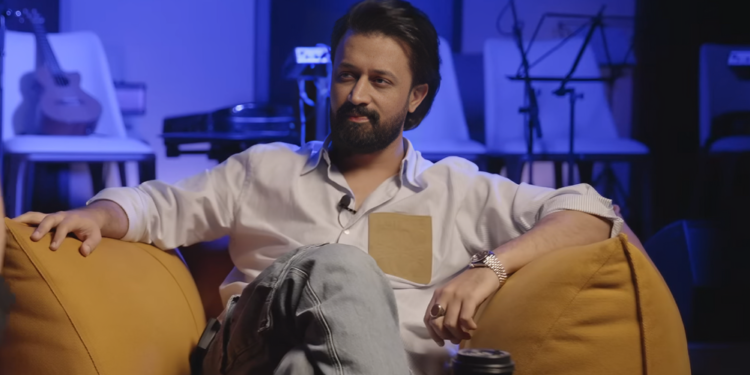Singer is set to make Bollywood comeback with romantic song for ‘Love Story of 90s’
Amid anticipation and nostalgia, the music and film worlds are abuzz with the imminent return of Pakistani singer and songwriter, Atif Aslam, who once dominated the Bollywood scene until India banned Pakistani artists seven years ago. As his cross-border fans gear up for their icon’s comeback with a romantic song for Love Story of 90s, Atif sat down for a candid interview reflecting on his relationship to music and audience.
“For me, my life, my breath, it’s all music,” Atif offered in conversation with RJ Sayema Rahman on Sufiscore. “It might sound orthodox but it’s the truth. If I don’t listen to good music, my day does not go well. If I don’t sing for a few days, I start to feel suffocation. When I have to contact my loved ones, I have to sing something for them. When I have to talk to Allah, I recite certain words.”
He went on to say, “I find music to be a gift that is bestowed on someone…All this is a gift, if it weren’t, I wouldn’t know whatever little I know about music.” Known for early hits like Pehli Dafa and Aadat to his recent releases such as Zindagi and Jee Ve Sohneya Jee, the musician revealed that he didn’t always possess the passion or sensibility for music.
Discovering music
Atif shared, “I was only going through some things in life when I listened to an album in a car. I must have been 12 or 13 years old, before that I didn’t know that singing was even a thing. I used to think the actors on screen were singing themselves.” The Jal Pari singer disclosed that this first album he listened to was of Nusrat Fateh Ali Khan with Michael Brooks.
“I listened to that and I began to wonder, what this was and why and how. No one knew and I fell into this circle, found a direction where I could find the opportunity to meet myself, to experience silence and solitude,” he expressed how his early musical journey consisted of just him and his faith in god, unbeknownst to his family.
Delving into anecdotes from his pre-career life, Atif shared his gradual entry into music, beginning with him contributing casually at a family event. “Then I went to a funfair with my friends and they teasingly bet that whoever goes to the stage and sings, the others will give him a treat. I knew none of them sang or could go up on the stage so I went and sang a little with the playing band.”
Cricket and parents’ approval
The singer contended that it was the positive reception then that properly encouraged him to sing. Articulating his appreciation for his long journey in retrospect and the success he could cultivate, Atif extended gratitude to his parents whose prayers made his life what it is today. “You know that feeling you get that you can’t survive this situation but some power would intervene and it was my parents’ prayers.”
Despite being a little apprehensive of his inclination towards music, Atif divulged that his parents were comforted when they realised his interests wasn’t solely about music but also about prayers and practising his faith. He further relayed how his parents never directly stopped him or discouraged him from pursuing his passion.
However, music was not Atif’s first love. “I had already given up on one passion. I always wanted to be a fast bowler,” he explained. “I was very good at cricket. So I had given up on that because my parents insisted that education is more important, [cricket] doesn’t have a lot of scope and they were right in saying that. Cricket didn’t have much scope back then, today the case might be different.”
The artist described how reconciling with the loss of this dream is what brought him to music. New to music, Atif found himself spending his days with his brother’s three-string guitar, attempting to make melodies without knowing most guitars typically have six strings. He said, “I learned after a whole year that guitars have 6 strings and a standard tuning to follow.”
‘Tajdar-e-Haram’ and fame
Discussing the distinct experience propelled by his more religiously-oriented works such as his rendition of Tajdar-e-Haram, Atif said, “In a live performance, for the first two hours and a few minutes, I sing for my audience. When I perform Tajdar-e-Haram, that’s only for me. Then it doesn’t even occur to me that there are people watching me…At that moment, I experience a flashback of all the sins I have committed but despite them, I have been given the honour to recite this.”
Atif further asserted the importance of personal integrity and authenticity at a time of virality, the internet and gadgets like autotuners. “It’s not like there were no autotuners in my time but nowadays it’s a dependency for overnight success. Now people want to be famous, they don’t want to work hard. People won’t stay on that pedestal for long now even though they want to but they don’t realise that without hard work all of this is very short-lived,” he commented.



 Pakistan Rupee Exchange Rate
Pakistan Rupee Exchange Rate





